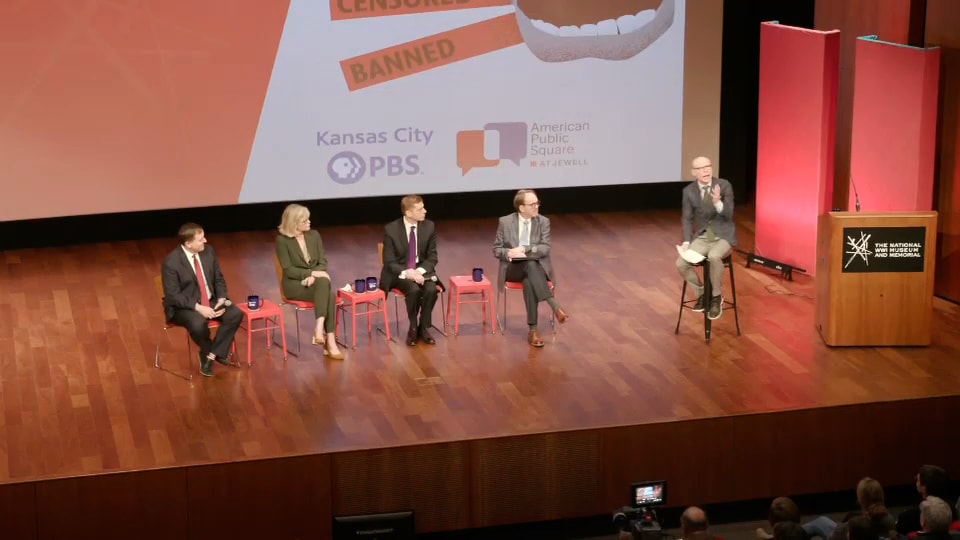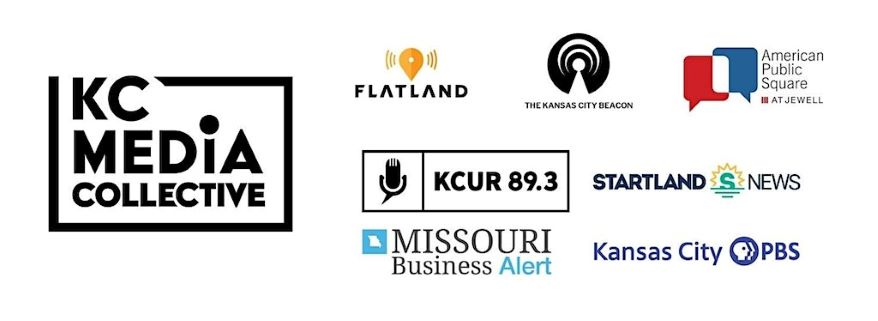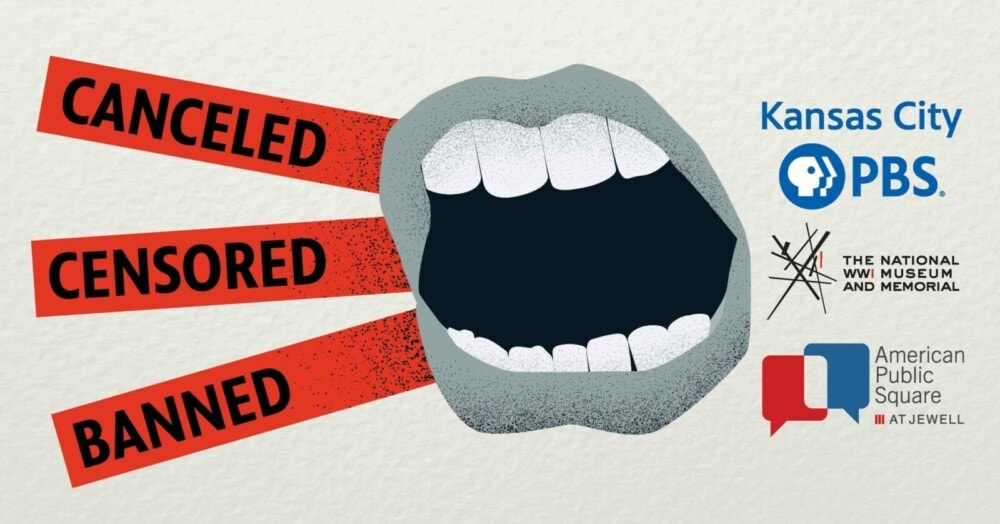- Home | curiousKC | Question Everything | Questions Answered |
- ‘Canceled, Censored, Banned’ Sparks Questions About Government, Books and Public Libraries
‘Canceled, Censored, Banned’ Sparks Questions About Government, Books and Public Libraries A Round-Up of Audience Questions, and What Local Leaders and Librarians Had to Say
Published April 7th, 2023 at 6:00 AM
Above image credit: This double display case at the Country Club Plaza branch of the Kansas City Public Library holds books provided to the library by an interfaith group called Cultural Crossroads. (Bill Tammeus | Flatland)For many, confusion abounds when new regulations become talking points across social media, in school libraries, in parent-teacher meetings and on the streets. A case in point is Missouri Secretary of State Jay Ashcroft’s proposed rule 1c addressing materials at public libraries.
New Rule
To help bridge the gap, Kansas City PBS, the National World War I Museum and Memorial and American Public Square partnered for a “Week in Review” special called “Canceled, Censored, Banned.” Panelists with different views came together to discuss their takes on legislation that restricts the type of books available to children and youth, moderated by “Week in Review” host Nick Haines.
Several issues come to the fore in the debate about censorship, appropriate versus inappropriate books and the laws that govern access for the public.
One focus of discussion was Ashcroft’s proposed rule, which added to the Library Certification Requirement for the Protection of Minors. Ashcroft said the rule was not an explicit book ban.
Friday on Kansas City PBS
The “Canceled, Censored, Banned” discussion will premiere on Kansas City PBS Channel 19.1 on April 7 at 7:30 p.m. as a special “Week in Review” episode.
“It doesn’t ban any books, even if I might like to. It doesn’t. That’s not my right,” Ashcroft explained. “But what it does do is it gives local libraries the ability to decide where they want to place materials and what materials they want to buy. And they have to publicize how they do.”
In November, the Kansas City Public Library posted a notice about this proposal, which “would require state-funded libraries to create collection development policies and public programming guidelines that ‘protect minors from non-age-appropriate materials.’”
The library underscored a piece that would directly impact how they operate: “Parents could challenge age designations for books and other items, and a library deemed noncompliant could forfeit appropriated funds from the Missouri State Library — an amount reaching in many cases into the hundreds of thousands of dollars.”
Second, public libraries in Missouri will lose out on $4.5 million in state funding. The Missouri House of Representatives approved the cut in March, according to St. Louis Public Radio.
During the discussion, Sally Bradshaw, who is a conservative bookstore owner, sought further clarification about the rule, expounding on her concerns about limiting what is made available on shelves.
“Whether it’s cancel culture or it’s rules on librarians restricting finances to get books for their libraries is censorship,” Bradshaw said. “We have the right to freedom of expression. … We don’t have the right not to be offended by people. That is not a right.”
For local librarians, new rules and regulations mean added time to review current policies. Some of this is taxing their already thin budgets and time, giving folks pause about what they can do under new guidelines.
Crystal Faris, deputy director of youth and family engagement at the Kansas City Public Library, is one of the librarians who will be affected by new policies.
“There’s always been this concern that public libraries had material, particularly for children, that was inappropriate,” Faris said. “I have been a children’s librarian for 30-some years. I lived through the Children’s Internet Protection Act.
“And I find it fascinating that we give a print book that kind of power when we’re not legislating what the child carries in their pocket.”
What follows is a roundup of questions asked by Haines, as well as audience members and some of the panelists’ answers during the event. Flatland has done additional outreach after the event to include the perspective of local public librarians.
Program panelists included Ashcroft, Florida-based independent bookstore owner Sally Bradshaw, journalist Michael Ryan and ACLU of Kansas Executive Director Micah Kubic. A follow-up interview was conducted with Faris.

Answers have been edited for length and clarity.
Q: What was the impetus behind this rule?
A: (Ashcroft) One, we were hearing outcries and concerns from other states. There was some outcry in our state. I was at a library directors meeting in Columbia, Missouri, where the library directors were talking to me about challenges, about materials, and eventually one of the librarians said that she should have the right to put anything in her library she wanted and that the taxpayers shouldn’t be able to decide that.
I said, ‘No, they pay for it.’ She said, ‘No, I have something in my library that represents everyone.’ I said we need to have guidelines so that we don’t run into these problems in Missouri.
Q: Are there specific instances of prurient materials allowed in a public library under current rules, which are accepted by librarians?
A: (Ashcroft) There wasn’t a specific incident in a library. I heard about what was happening supposedly in other states.
A: (Faris) This proposed administrative rule seems to imply that it is (setting guidelines for) children and teenagers. So, they’re treating a 17-year-old, an 18-year-old the same as they are treating a 2- or 3-year-old. In my personal opinion, teenagers need more information. …
Our policies have to be clear. Essentially at this point, we have to determine whether it’s OK or not, and put that in our policies, and then see if that’s acceptable by the Secretary of State.
Q: What happens when librarians disagree? And how do libraries decide on what books to buy?
A: (Faris) When we disagree with each other, we talk it out. … It usually ends up being that we go ahead and purchase the item if the budget allows.
If the question is about what happens when librarians disagree with the proposed rule, then the implication is that we would not receive state funding if we did not comply. Every library is going to have to decide whether they are going to comply because the amount of state funding is worth that or whether they are not going to comply. It is a challenging question.
Q: Would you stock the new cleaned-up versions of Roald Dahl books? Titles like ‘Charlie and The Chocolate Factory’ and ‘James and the Giant Peach’ have been edited to be more inclusive by removing the word ‘fat’ to describe characters like Augustus Gloop and even eliminating the words ‘boy’ and ‘girl’ and replacing them with the word ‘children.’
A: (Bradshaw) That’s a great question. There is censorship on the (political) right and left. Roald Dahl is an example of that. I mean, who did not read ‘James and the Giant Peach’ or ‘Charlie and the Chocolate Factory’ growing up? And yet there is sensitivity to language that has been expressed in those. I will stock the older books and I’ll stock the newer ones just as I’ve done with Dr. Seuss. That gives people choices and options.
Q: Is the library going to have to spend a bunch of time and money creating or enforcing new policies for roles? Will this affect chunks of the budget?
A: (Faris) We’re not completely sure at this point. Yes, complying will take significant staff time. It has already meant time really reading through our policies and procedures, seeing what they say, where they might possibly be in conflict and where they might possibly be fine, which is not a bad thing. We should do that on a regular basis anyway.
One of my concerns is that we will be so concerned about (what constitutes) pornographic that we will self-censor ourselves, and that we won’t purchase items that children and teens deserve to have access to. I don’t think we will. But I think it’s something that we’re going to have to be very aware of.
Q: What is the sentiment among library staff right now?
A: (Faris) There’s confusion around helping the public understand what’s going on. We as leaders in the library don’t know. We don’t have answers. But I don’t know that anyone has answers right now, definitive answers. Staff are concerned.
There has been concern about if the budget cuts go through, does everybody still have a job. As you think about those kinds of things, when you’re looking at them saying that they completely defunded libraries, what does that mean?
Is it legal and reasonable for an elected leader to restrict words if the goal is to protect the health and well-being of our most vulnerable citizens, our children?
A: (Kubic) It is absolutely true that the First Amendment still exists in this country. There are folks who believe that it is under attack, but it still exists.
And that means that censorship by the government remains a problem no matter where it happens, no matter where it is taking place. I have my hands full in the state of Kansas, so I don’t particularly want to comment on what’s happening in the state of Missouri. But I will say that these sorts of book bans, these sorts of restrictions, regulations on libraries and others oftentimes do not result in content that is actually objectionable.
Q: What authority do library boards have on policies that guard what is deemed inappropriate or appropriate?
A: (Faris) Every public library is chartered with the state, and the rules and regulations around that public library are related to their charter. Our library board is appointed by the mayor. We have one seat that’s appointed by the mayor of Independence because our boundaries are the original boundaries of the Kansas City, Missouri, School District, not the current boundaries.
The library board has primary financial responsibility. And they set the tax levy. All of our meetings are public. And everything we do is subject to the sunshine law. So, I think that it would be good for people to know that. Nothing that a library does is in secret. We’re responsible to them.
Q: Is it safer to permit all speech, however objectionable?
A: (Kubic) I think no one has a constitutional right to a platform on campus, just as I agree that no one has a constitutional right to have their book present in the library. But I do think in general that more speech is better. I do think that controversial speakers should be allowed on campus, and are required to be allowed on campus under the Constitution. And I also think that that doesn’t mean that the rest of us have to listen to them or agree with them, and that we do not have to sit in silent reverence for any presentation that they make.
Q: How are library professionals reacting to proposed rules?
A: (Faris) We’re being told we weren’t good at helping people find the materials that they wanted. We were told that we weren’t protecting children. We’ve been told that while we thought we were doing good work for children, the secretary of state did not think we were doing good work for children. In a way, that’s how it can be interpreted. The secretary of state is saying that we didn’t do a good job. And that the secretary of state needs to step in and tell us what to do so that we protect children because we weren’t doing it. We thought we were doing good things for children.
People come to the library because they want to. They come to the library because it’s a safe place for them because it’s welcoming and open. We’re not, we’re not used to being the bad guy. And the target of some serious anger. That’s been hard, I think, emotionally on the staff.
Vicky Diaz-Camacho covers community affairs and heads up the journalism engagement series, curiousKC, for Kansas City PBS.

Tags: American Public Square • book laws • Books • Bookstores • Civic Engagement • curiousKC • curiousKC Round-Up • KC Media Collective • law • Missouri
Like what you are reading?
Discover more unheard stories about Kansas City, every Thursday.
Thank you for subscribing!
Check your inbox, you should see something from us.
Ready to read next
Torn Label Brewing Adds Spice to its Suds with Tacos Valentina
Read StoryRelated Stories
Kansas City-area Politicians Pick Between War on Drugs or Treatment When Spending Opioid Settlement Cash
Cities and counties in the metro are starting to spend windfalls from legal settlements with companies that made, shipped and sold opioids. While some prioritize law enforcement efforts to reduce drugs on the street, others try to attack demand by getting people into treatment.
by Suzanne King, The Beacon | 04-17-2024
Newspapers in Rural Areas are Folding, Leaving Vast News Deserts
The U.S. has lost more than 2,800 newspapers since 2005, many of them in rural areas. Now some journalists are redoubling their efforts to provide local news and trying new models in a difficult industry.
by Jim Meadows, Harvest Public Media | 04-15-2024



